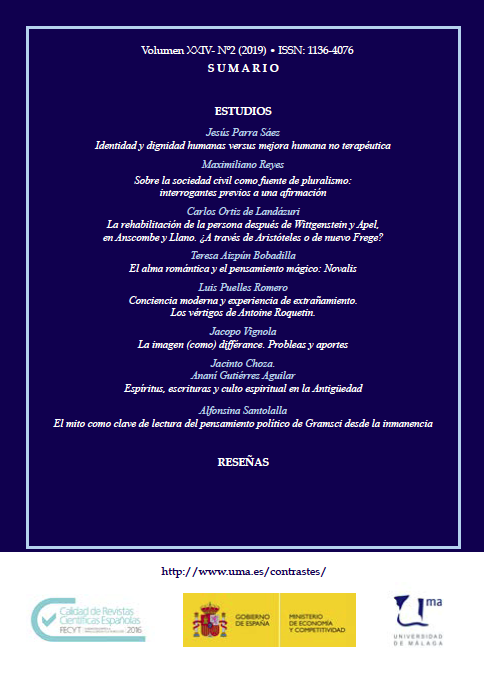Modern consciousness and experience of estrangement.The vertigo of Antoine Roquentin
DOI:
https://doi.org/10.24310/Contrastescontrastes.v24i2.6864Keywords:
CONSCIOUSNESS, DESCARTES, SARTRE, ESTRANGEMENTAbstract
Beginning with the Melancholy of Lucas Cranach of 1532, we investigate about the Cartesian lineage of the vertigo of uncertainty that Antoine Roquentin suffers, the protagonist of Sartre’s Nausea. A certain syndrome is addressed in these pages, consisting in the difficulty of discern-ment between what happens outside the conscience and what is not more than mental representation, to sustain that this ambiguity is the condition of possibility of the modern consciousness, that of a sustained consciousness in its very contingency.Downloads
Metrics
Publication Facts
Reviewer profiles N/A
Author statements
Indexed in
-
—
- Academic society
- N/A
- Publisher
- Universidad de Málaga
References
Deleuze, G., «Renverser le platonisme» en Revue de Métaphysique et de morale, 1967 ; en Logique du sens, Paris, Minuit, 1969.
Descartes, R., Œuvres et Lettres. Paris: Gallimard-La Pléiade, 1953.
Enaudeau, C., La paradoja de la representación. Buenos Aires: Paidós, 1999.
Freud, S., Lo siniestro. Barcelona: José J. de Olañeta, 1979.
Kant, I., Antropología en sentido pragmático. Madrid: Alianza Ed., 2004.
Crítica del discernimiento. Madrid: Antonio Machado Libros, 2003.
Nietzsche, N., Sobre verdad y mentira en sentido extramoral. Madrid: Tecnos, 2012.
Sartre, J.-P., La nausée. Paris: Gallimard (col. Folio), 1999.
Todorov, T., Introduction à la littérature fantastique. Paris: Seuil, 1970.
Downloads
Published
How to Cite
Issue
Section
License
This journal provides immediate free access to its content under the principle of making research freely available to the public. All content published in Contrastes. Revista Internacional de Filosofía, are subject to the Creative Commons Attribution-NonCommercial-ShareAlike 4.0 license whose full text can be found at <http://creativecommons.org/licenses/by-nc-sa/4.0>
It is the responsibility of the authors to obtain the necessary permissions of the images that are subject to copyright.
Authors whose contributions are accepted for publication in this journal will retain the non-exclusive right to use their contributions for academic, research and educational purposes, including self-archiving or repository in open access repositories of any kind.
The electronic edition of this magazine is edited by the Editorial Service of the University of Malaga (Uma Editorial), being necessary to cite the origin in any partial or total reproduction.










5.png)
